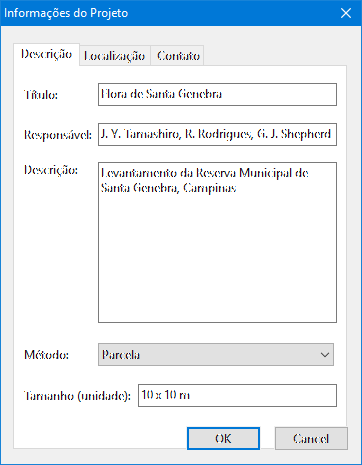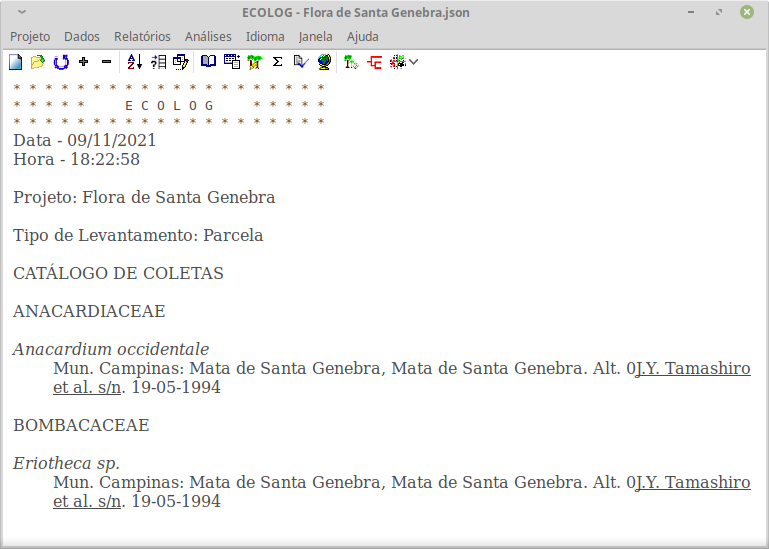Overview 
ECOLOG is a specimen-based, cross-platform relational database management system, aimed at the storage, retrieval and preliminary analysis of data on sites, species, and specimens gathered in ecological field surveys and biodiversity inventories.
The main goal of ECOLOG is to make the data gathered in ecological field surveys readily accessible, providing lists of species collected in the study area and informations on habitat preferences, abundance or rarity of a given species, biometrics, morphology, dominance, and spatial location of each specimen collected in the field. The system also aims at contributing to the adoption of a minimum standard for gathering, storing, and exchanging of data from ecological surveys and biodiversity inventories, avoiding duplication of efforts in different research and environmental management projects and institutions.
The development of ECOLOG has been based on, and incorporates many of the items, in the list of Desirable Attributes of Ecological Software.
ECOLOG is written in FreePascal/Lazarus, a free, cross-platform object-oriented programming language for Rapid Application Development. Therefore, the program is platform-independent, and can run without modifications on any PC compatible with the x86 architecture, under GNU/Linux, MacOSX, and MS-Windows.
Features 
Applications 
- Faunistic or floristic surveys
- Conservation inventories
- Environmental impact assessments
- Phytosociological studies
Screenshots 
Click on the images to enlarge.
Data Table (MS-Windows) |
Data Table (GNU/Linux) |
Project Form (MS-Windows) |
Project Form (GNU/Linux) |
Report (MS-Windows) |
Report (GNU/Linux) |
Database Statistics (MS-Windows) |
Database Statistics (GNU/Linux) |
Use Cases 
-
The Atlantic Rainforest Research Program at Rio de Janeiro Botanical Garden, collated a database with about 20,000 specimen records and 2,000 records of plant species collected at Macaé de Cima Ecological Reserve, Nova Friburgo, Rio de Janeiro (Dalcin et al., 1997) and another one with about 600 specimen records and 140 plant species from Paraíso State Ecological Station, Cachoeiras de Macacu, Rio de Janeiro (Kurtz & Araujo, 2000).
-
The Jacarepiá State Ecological Reserve Integrated Biological Survey, Saquarema, Rio de Janeiro, conducted by Rio de Janeiro State Foundation of Environmental Engineering, created a database with about 300 specimen records e 200 plant species (Sá et al., 1991).
-
Biotupé Project, at National Institute of Amazon Research, Manaus, Amazonas, geared towards the management and analysis of biodiversity data from Tupé Lake Sustainable Development Reserve (Cavalcanti, 2005).
Publications 
Cavalcanti, M.J. 1991. ECOLOG: um sistema de banco de dados para levantamentos ecológicos de campo. Resumos do XVIII Congresso Brasileiro de Zoologia, Salvador, p. 557.
Cavalcanti, M.J. 1993. ECOLOG: um sistema gerenciador de bancos de dados para levantamentos ecológicos de campo. Resumos do I Simpósio de Aplicações da Informática em Biologia, Campinas, pp. 44-45.

Cavalcanti, M.J. 1998. Aplicações de Sistemas Gerenciadores de Bancos de Dados em Ecologia e Sistemática. Acta Biologica Leopoldensia, São Leopoldo 20: 5-20.
Cavalcanti, M.J. 2005. Bancos de dados sobre biodiversidade na Amazônia: a experiência do Projeto Biotupé. In: Santos-Silva, E.N., Aprile, F.M., Scudeller, V.V. & Melo, S. (orgs.), BioTupé: Meio Físico, Diversidade Biológica e Sociocultural do Baixo Rio Negro, Amazônia Central. Instituto Nacional de Pesquisas da Amazônia, Manaus, pp. 199-213.
Cavalcanti, M.J. 2011. ECOLOG: um sistema gerenciador de bancos de dados para levantamentos ecológicos de campo e inventários de biodiversidade. In: Santos-Silva, E.N., Scudeller, V.V. & Cavalcanti, M.J. (orgs.), BioTupé: Meio Físico, Diversidade Biológica e Sociocultural do Baixo Rio Negro, Amazônia Central - Volume 3. Rizoma Editorial, Manaus, pp. 291-302.

Dalcin, E., Solano, L. & Pizarro, R. 1997. De banco de dados a centro de informações e serviços: uma experiência para a Reserva Ecológica Macaé de Cima. In: Lima, H.C. & Guedes-Bruni, R.R. (orgs.), Serra de Macaé de Cima: Diversidade Florística e Conservação em Mata Atlântica. Jardim Botânico do Rio de Janeiro, Rio de Janeiro, pp. 307-314.

Kurtz, B.C. & Araujo, D.S.D. 2000. Composição florística e estrutura do componente arbóreo de um trecho de Mata Atlântica na Estação Ecológica Estadual do Paraíso, Cachoeiras de Macacu, Rio de Janeiro, Brasil. Rodriguésia, Rio de Janeiro 51: 69-112.

Sá, C.F.C., Araujo, D.S.D., Lima, H.C., Cavalcanti, M.J., Pereira, M.C.A. & Fontoura, T. 1991. Composição florística e estrutura da floresta de cordão arenoso da Reserva Ecológica de Jacarepiá, Saquarema (RJ): dados preliminares. Resumos do XLII Congresso Nacional de Botânica, Goiânia, p. 527.
Download 
The software is available from the ECOLOG website at SourceForge. The source code is also available from GitHub. The program and documentation are contained in an executable installation package for MS-Windows and in a Debian package for GNU/Linux. To install, download and save the installation package corresponding to your operating system in any folder on your computer, and start it by clicking on the installation package from the file manager program. After installation, start the software by clickiing on the proper item at the start menu. Executable versions for MacOSX are not yet available.
ECOLOG is free software, distributed under the terms of the GNU General Public License (GPL).
Documentation 
The software is user-friendly and its use should be fairly intuitive. A user's manual (in Brazilian Portuguese) is available here and is also included in the software installation packages.
The ECOLOG User Manual is distributed under the terms of the GNU Free Documentation License (GNU FDL ), version 1.3 or later.
Support 
A community driven support forum for ECOLOG with free registration is available at Google Groups (ECOLOG-L). It is recommendable to join the forum for participating in discussions and exchanging questions about the software, as well as to get information about updates and bugs.
Translations 
ECOLOG is initially available in English, Spanish, and Brazilian Portuguese. Any interested person can provide a translation for her/his native language. No knowledge of programming is required, just a freely available and easy to use software tool as POEdit or Virtaal. Please contact me for further details.
Donations
Contribute with a donation and help to keep alive the development of ECOLOG. Donations can be made with credit card, using PayPal.
Contact 
Dr. Mauro J.
Cavalcanti
Ecoinformatics Studio
P.O. Box 18123, CEP 20720-970, Rio de Janeiro, Brazil
Copyright © 2000-2021
|
Last modified: November 14th, 2021 |
Sponsored by  |










